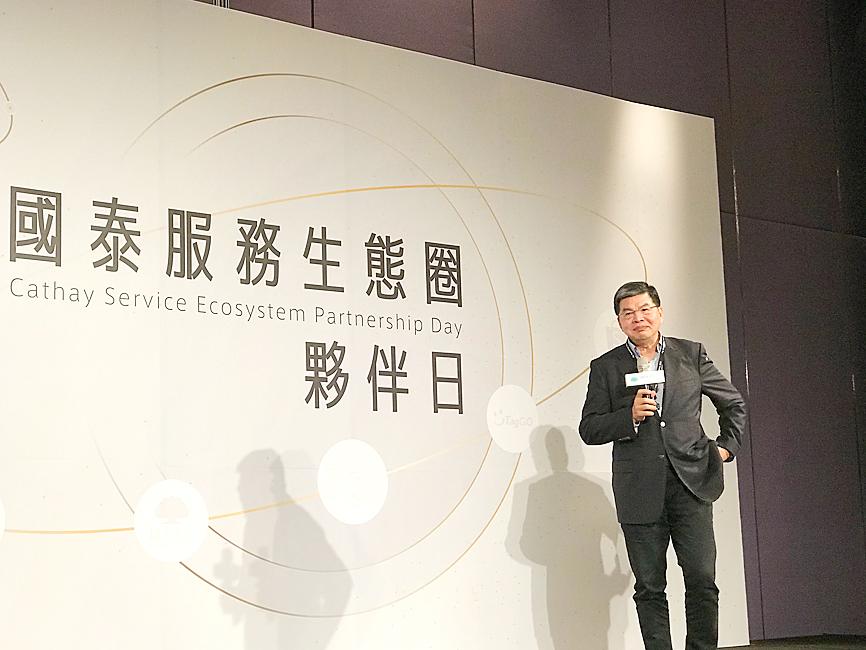The nation’s life insurance market might continue its downturn due to new regulations that took effect yesterday, but the market is expected to stabilize by the end of this year, Cathay Financial Holding Co (國泰金控) president Lee Chang-ken (李長庚) said yesterday in Taipei.
“It is foreseeable that sales of life insurance products would continue to fall in the short term as consumers are likely to purchase fewer policies after premiums went up,” Lee said at the Cathay Service Ecosystem Partnership Day.
“However, it seems to me that consumer demand for insurance products tends to be rigid and they might reconsider if they really need insurance products,” he said. “Nonetheless, insurance sales are expected to recover gradually.”

Photo: CNA
The new regulations would help the life insurance industry develop in a healthier way in the long term, he said.
Four new regulations took effect yesterday as the Financial Supervisory Commission (FSC) aims to boost life insurers’ financial solvency and prepare them for the implementation of new insurance contracts standard IFRS 17 in 2025.
The commission lowered life insurance companies’ liability reserve interest rates on all policies denominated in New Taiwan dollars and US dollars by 25 basis points and 50 basis points respectively to keep them in line with declining market rates.
The commission also set a new lower limit on the death benefit-to-policy value ratio, which would incentivize insurers to sell fewer savings plans or policies linked with wealth management, as they provide fewer death benefits.
Insurance companies must calculate the contractual service margins of their products and make sure the margins are positive when applying to the FSC.
Companies are also requested to adopt a mechanism to stabilize their products’ declared interest rates, which determine the bonuses that policyholders receive.

South Korea’s equity benchmark yesterday crossed a new milestone just a month after surpassing the once-unthinkable 5,000 mark as surging global memory demand powers the country’s biggest chipmakers. The KOSPI advanced as much as 2.6 percent to a record 6,123, with Samsung Electronics Co and SK Hynix Inc each gaining more than 2 percent. With the benchmark now up 45 percent this year, South Korea’s stock market capitalization has also moved past France’s, following last month’s overtaking of Germany’s. Long overlooked by foreign funds, despite being undervalued, South Korean stocks have now emerged as clear winners in the global market. The so-called “artificial intelligence

NEW IDENTITY: Known for its software, India has expanded into hardware, with its semiconductor industry growing from US$38bn in 2023 to US$45bn to US$50bn India on Saturday inaugurated its first semiconductor assembly and test facility, a milestone in the government’s push to reduce dependence on foreign chipmakers and stake a claim in a sector dominated by China. Indian Prime Minister Narendra Modi opened US firm Micron Technology Inc’s semiconductor assembly, test and packaging unit in his home state of Gujarat, hailing the “dawn of a new era” for India’s technology ambitions. “When young Indians look back in the future, they will see this decade as the turning point in our tech future,” Modi told the event, which was broadcast on his YouTube channel. The plant would convert

‘SEISMIC SHIFT’: The researcher forecast there would be about 1.1 billion mobile shipments this year, down from 1.26 billion the prior year and erasing years of gains The global smartphone market is expected to contract 12.9 percent this year due to the unprecedented memorychip shortage, marking “a crisis like no other,” researcher International Data Corp (IDC) said. The new forecast, a dramatic revision down from earlier estimates, gives the latest accounting of the ongoing memory crunch that is affecting every corner of the electronics industry. The demand for advanced memory to power artificial intelligence (AI) tasks has drained global supply until well into next year and jeopardizes the business model of many smartphone makers. IDC forecast about 1.1 billion mobile shipments this year, down from 1.26 billion the prior

People stand in a Pokemon store in Tokyo on Thursday. One of the world highest-grossing franchises is celebrated its 30th anniversary yesterday.